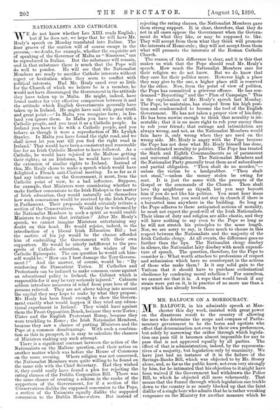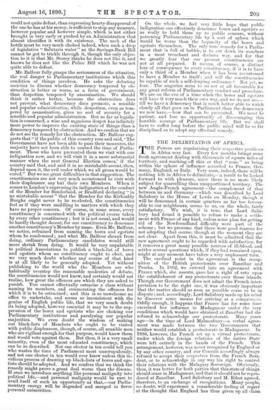MR. BALFOUR ON A BOREOCRACY.
MR. BALFOUR, in his admirable speech at Man- chester this day week, insisted with great power on the disastrous result to the country of allowing the men who determine the scope and compass of Parlia- mentary government to be the bores and egotists who effect that determination not even by their own preferences, but solely by narrowing the orifice through which legisla- tion can pass till it becomes almost impossible for any to pass that is not approved equally by all parties. The effect of that is administration, indeed, by the representa- tives of a majority, but legislation only by unanimity. We have just had an instance of it in the failure of the Savings-Banks Bill, which was objected to by Mr. Storey alone, and, so far as the public know, not even very strongly by him, for he intimated that his objection to it might have been waived if the Government had withdrawn the Police Bill, to which he objected still more vehemently. That means that the funnel through which legislation can trickle down to the country is so nearly blocked up that the faint dislike of a single bore who admits that he is rather wreaking vengeance on the Ministry for another measure which he could not quite defeat, than expressing hearty disapproval of the one he has at his mercy, is sufficient to stop any measure, however popular and however simple, which is not either brought in very early or pushed by an Administration that almost identifies it with its existence. The neck of the bottle must be very much choked indeed, when such a drop of legislative " Salutaris water" as the Savings-Bank Bill cannot be got to trickle through it, though the only objec- tion to it is that Mr. Storey thinks he does not like it, and knows he does not like the Police Bill which he was not quite able to defeat.
Mr. Balfour fully grasps the seriousness of the situation, the real danger to Parliamentary institutions which this condition of things involves. He asks the debating societies to discuss whether democracy tempered by ob- struction is better or worse, as a form of government, than despotism tempered by assassination. We should think it rather better, because the obstruction does not prevent, what democracy does promote, a sensible and popular administration, while despotism, even as tem- pered by assassination, gives no sort of security for a sensible and popular administration. But so far as legisla- tion is concerned, a wise and sagacious despot has infinitely more power to improve the existing state of things than a democracy tempered by obstruction. And we confess that we do not see the remedy for the obstruction. Mr. Balfour sug- gests that " if the public of this country rose and said, The Government have not been able to pass their measures, the majority have not been able to control the time of Parlia- ment. Those who have prevented them we visit with our indignation now, and we will visit it in a more substantial manner when the next General Election comes,' if the country said that, and said it in no mistakable accent, then, depend upon it, the evil under which we all groan would be cured." But we see great difficulties in that suggestion. The constituencies are not very much accustomed to visit with their displeasure any but their own Members. When it comes to London's expressing its indignation at the conduct of the Member for Sunderland, or Bradford declaring " in no mistakable accent" that the Member for the Kirkcaldy Burghs ought never to be re-elected, the constituencies feel as if they were meddling in matters with which they have no proper concern. Of course, in some sense, every constituency is concerned with the political course taken by every other constituency ; but it is not usual, and would be hardly thought decent, for one constituency to denounce another constituency's Member by name. Even Mr. Balfour, we notice, refrained from naming the bores and egotists whom he condemned ; and what Mr. Balfour shrank from doing, ordinary Parliamentary candidates would. still more shrink from doing. It would be very unpalatable to political Associations to publish a black-list of bores and egotists whom no constituency ought to elect, and we very much doubt whether any course of that kind is at all likely to be generally adopted. Yet without publishing to the world who the Members are who habitually overstep the reasonable modesties of debate, the constituencies would not know, and certainly would not realise, how great the offences are which they are asked to punish. You cannot effectually ostracise a class without naming its members, and enumerating the offences for which it is to be ostracised ; and this is so unwelcome an office to undertake, and seems so inconsistent with the genius of English public life, that we very much doubt its being adopted, however essential it may be to the sup- pression of the bores and egotists who are choking our Parliamentary institutions and paralysing our popular majorities. We even doubt the wisdom of making out black-lists of Members who ought to be visited with public displeasure, though, of course, all sensible men who are vigilant enough for that purpose, would know them and would vote against them. But then, it is a very small minority, even of the most educated constituency, which can be so described. Not one elector in ten could tell you who wastes the time of Parliament most unscrupulously, and not one elector in ten would ever know unless this in- vidious process of drawing up black-lists of bores and ego- tists should be adopted. And we confess that we think the remedy might prove a great deal worse than the disease. If once we introduce anything like personal malignity into political life,—and personal malignity would be sure to avail itself of such an opportunity as that,—our Parlia- mentary energy will be degraded and merged in fierce personal animosities. On the whole, we feel very little hope that public indignation can effectively denounce bores and egotists so as really to hold them up to public censure, without poisoning Parliamentary life by a sort of spleen which would be worse than the loquacity of the bores and egotists themselves. The only true remedy for a Parlia- ment that is full of babble, is to cut down its numbers in a most trenchant and decisive way, and for that we greatly fear that our present constituencies are not at all prepared. It means, of course, a distinct loss of consequence to every constituency, if it is to have only a third of a Member when it has been accustomed to have a Member to itself ; and will the constituencies. be capable of such a self-denying ordinance ? Not yet, we fear. The auguries seem to us not at all favourable for any great reform of Parliamentary conduct and procedure. We are on the eve of a time when the bores and egotists will have it very much their own way, and we do not see,— till we have a democracy that is much better able to watoh closely all that goes on in Parliament than the democracy we now have,—how that can be prevented. We must be patient, and lose no opportunity of discouraging this horrible scourge of Parliamentary life. But we shall have to suffer long before the public mind will be so Km disciplined as to adopt any effectual remedy.



































 Previous page
Previous page